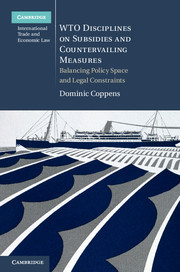Description
WTO Disciplines on Subsidies and Countervailing Measures
Balancing Policy Space and Legal Constraints
Cambridge International Trade and Economic Law Series
Author: Coppens Dominic
A legal and normative analysis of WTO disciplines on industrial and agricultural subsidies and countervailing duties.
Language: English
Subject for WTO Disciplines on Subsidies and Countervailing Measures:
Approximative price 147.50 €
In Print (Delivery period: 14 days).
Add to cart
Publication date: 05-2014
Support: Print on demand
Support: Print on demand
Description
/li>Contents
/li>Biography
/li>
Does the WTO leave appropriate policy space to its Members to pursue legitimate objectives, such as the economic development of developing countries, the conversion to a greener economy, or recovery in times of a global economic downturn? This legal and normative analysis of the WTO rules on subsidies and countervailing measures sheds light on why governments resort to subsidization and, by tracing the historical origins of the SCM Agreement and the Agreement on Agriculture, on why they have been willing to gradually confine their policy space. This sets the stage for a systematic and comprehensive legal analysis of both agreements, which integrates the vast amount of case law and proposals tabled in the Doha round. A separate case study explores the complex rules on export credit support, and the book closes with an in-depth normative assessment of these WTO rules on subsidies and countervailing measures.
General introduction; 1. Rationales for offering subsidies; Part I. Legal Disciplines on Subsidization and the Imposition of Countervailing Measures: 2. Historical overview; 3. Scope of the SCM Agreement; 4. Disciplines on subsidies; 5. Remedies; 6. Differential treatment; Part II. Case Study: WTO Disciplines on Export Credit Support: 7. Export credit support; 8. Rationale for disciplining export credit support: historical context; 9. Main elements of the OECD Arrangement; 10. Disciplines on export credit support for non-agricultural products; 11. Disciplines on export credit support for agricultural products; 12. Export credit support in light of the GATS; 13. Negotiations on export credit support disciplines in the Doha round; 14. Conclusion: normative analysis of disciplines on export credit support; Part III. Normative Analysis of Disciplines on Subsidization and the Imposition of Countervailing Measures: 15. The scope of the SCM Agreement: specific subsidies; 16. Disciplines on subsidization by developed countries; 17. Disciplines on subsidization by developing countries; 18. Disciplines on countervailing measures; 19. Disciplines on subsidies in light of policy responses to the economic crisis; Overall conclusion.
Dominic Coppens is an associate at Sidley Austin LLP's Geneva office, where he is a member of the firm's International Trade and Arbitration group. He advises governments and private stakeholders on international trade matters, with a focus on dispute settlement under the auspices of the World Trade Organization. He is also an associate member of the Leuven Centre for Global Governance Studies at the University of Leuven, Belgium.
© 2024 LAVOISIER S.A.S.




